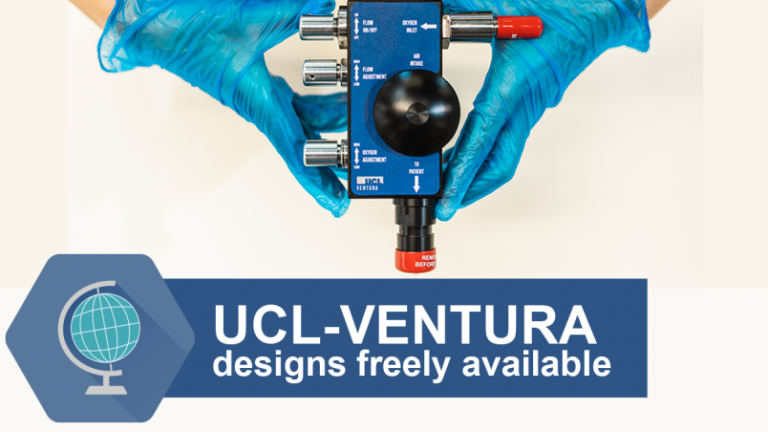UCL and partners develop and license innovative COVID-19 breathing aid in record time
Early in the coronavirus pandemic, engineers, clinicians and innovation specialists came together to rapidly develop, manufacture and license a breathing aid for sick COVID-19 patients.

9 May 2022
The UCL-Ventura project was a collaboration between UCL, UCL Hospitals NHS Foundation Trust (UCLH), Formula 1 engineers Mercedes AMG HPP and UCL Business (UCLB).
The device has been used in over 130 NHS hospitals in the UK.
The designs of the device and manufacturing instructions were made freely available through UCLB, the commercialisation arm of UCL and part of UCL Innovation & Enterprise.
The designs and instructions have been accessed by organisations in 129 countries and more than 24,000 devices have been made around the world. The UCL-Ventura has been used on patients in 30 countries, including Pakistan, Peru and Uganda.
Collaborating at speed in the midst of a pandemic
In the middle of March 2020, the number of COVID-19 patients admitted to hospital with respiratory problems began to increase rapidly. Official guidance recommended early mechanical ventilation, but there was little hope of manufacturing enough of these complicated machines in time.
After reviewing clinical data from Italy and China, clinicians at UCLH, including Professor Mervyn Singer (UCL Medicine), realised that simpler, less-invasive breathing aids could be used to manage COVID-19 patients. These Continuous Positive Airway Pressure (CPAP) devices work with a close-fitting face mask, and avoid the need for sedation and intubation. Evidence suggested that their use prevented around 50% of patients from needing invasive mechanical ventilation.
However, UCLH had very few CPAPs and were unable to buy them in bulk. Mervyn reached out to engineers Professor Rebecca Shipley (Director of UCL Institute of Healthcare Engineering) and Professor Tim Baker (UCL Mechanical Engineering) who brought in longstanding collaborators Andy Cowell and Ben Hodgkinson from Mercedes AMG HPP to come up with a solution.
Together the team devised a plan to reverse engineer an off-patent CPAP device that was no longer produced.
Within 100 hours of the first meeting they had a working prototype, the UCL-Ventura. After successful testing at UCLH hospitals and further modifications, the device gained special approval from the UK’s Medicines and Healthcare Products Regulatory Agency (MHRA) just 10 days later, on 2 April.
The UK Government’s Department of Health and Social Care ordered 10,000 devices. These were produced at a rate of up to 1,000 a day at the Mercedes AMG HPP technology centre in Brixworth, Northamptonshire.
Licensing the designs to meet global demand
As the UCL-Ventura was being developed, approved and manufactured, a team of innovation specialists and business managers were working to ensure the rest of the world could benefit.
UCLB arranged the necessary licensing to make the designs available for manufacturers around the world to download at no cost. Licences were managed through a bespoke implementation of e-lucid, an online technology licensing platform developed and hosted by UCLB.
The licensed package also specifies materials, tools and kit used in the rapid prototyping process, as well as the fabrication time for each part.
Within two days of the designs being made available, nearly 700 requests to license the files had been approved by UCL. These requests came from manufacturers, non-profits, health experts and research institutes across 25 countries.
As of May 2022, 2,085 people from 129 countries have downloaded the designs. Of these, at least 30 teams moved on to volume manufacture and hospital testing of their own devices.
Alsons Group in Pakistan are one of the international teams who successfully gained regulatory approval in their country.
In 2020, Director of Alsons Group, Akbar Allana said: “I want to thank the fantastic team at UCL for providing us with the technical knowledge and support throughout this period. Manufacturing medical devices and accessories is a completely new (and exciting!) field for us, and it's thanks to you that we've made such a big breakthrough in this. We hope we can contribute positively to the health and well-being of our fellow humans through this new sector we are entering.”
The UCL-Ventura team won the 2020 Health Service Journal Award for Acute Innovation of the Year and the Royal Academy of Engineering President’s Special Award for Pandemic Services.
Professor Rebecca Shipley, Director of UCL Institute of Healthcare Engineering, co-led the UCL-Ventura team. She said: “These life-saving devices are relatively simple to manufacture and can be produced quickly. My thanks goes to the brilliant engineers, business managers and team at UCLB who have come together and made this happen at a pace that would be considered unimaginable under normal circumstances.”
Links
Find out more about:
- UCLB
- UCL-Ventura
- Innovation and enterprise support for staff
- Innovation and enterprise support for external organisations
- UCL Institute of Healthcare Engineering
Photo © James Tye / UCL
 Close
Close

